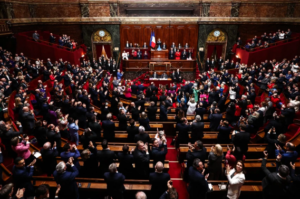France’s decision on March 4 to embed the right to abortion in its constitution marks a significant milestone in the ongoing struggle for reproductive rights. The move, which makes France the first country to enshrine abortion rights in its constitution, represents a historic victory for advocates of women’s autonomy over their bodies and choices.
This development reflects not only the evolving legal landscape surrounding abortion but also the broader societal shifts towards recognizing and protecting women’s rights.
Parliamentary Approval in France
 The process of incorporating the right to abortion into France’s constitution began with parliamentary deliberations and culminated in a decisive vote in favour of revising the country’s 1958 constitution.
The process of incorporating the right to abortion into France’s constitution began with parliamentary deliberations and culminated in a decisive vote in favour of revising the country’s 1958 constitution.
This legislative journey underscores the importance of democratic institutions in shaping and safeguarding fundamental rights.
By formally recognizing women’s “guaranteed freedom” to terminate pregnancies, the French parliament has affirmed its commitment to upholding the principles of equality and bodily autonomy.
Public Support and Political Critique
 Public support for the constitutional amendment has been overwhelming, with polls indicating widespread endorsement of the measure.
Public support for the constitutional amendment has been overwhelming, with polls indicating widespread endorsement of the measure.
This widespread backing reflects a broader societal consensus on the importance of preserving and expanding reproductive rights.
The overwhelming public support for the amendment sends a powerful message about the values and priorities of French society, reaffirming the nation’s commitment to gender equality and women’s empowerment.
However, the parliamentary process also sparked debates and critiques, particularly regarding the motivations behind the constitutional revision. Some critics have raised concerns about potential political calculations driving the decision, suggesting that President Emmanuel Macron may be seeking to leverage the issue for electoral gains.
While these critiques highlight the complexities of political manoeuvring, they do not detract from the significance of the constitutional amendment itself.
International Context and Vatican Opposition
Internationally, France’s decision to enshrine abortion rights in its constitution has reverberated across borders, particularly in the context of global debates on reproductive rights. The move comes at a time when reproductive rights are under threat in various parts of the world, including the United States, where the right to abortion has faced significant challenges.
France’s bold step sends a powerful message of solidarity with advocates of reproductive justice worldwide, offering hope and inspiration to those fighting for similar rights in their own countries.
However, not all reactions to France’s constitutional amendment have been positive. The Vatican and other religious institutions have voiced opposition to the decision, reiterating their stance against abortion. This opposition underscores the ongoing tensions between religious doctrine and secular law on issues of reproductive health.
While religious institutions are entitled to their beliefs, France’s commitment to secularism and the separation of church and state ensures that decisions regarding reproductive rights are grounded in principles of equality and individual liberty.
In embracing the right to abortion as a constitutional principle, France has reaffirmed its commitment to upholding the fundamental rights and freedoms of its citizens. By enshrining women’s autonomy over their bodies in its founding document, France has taken a decisive step towards building a more inclusive and equitable society.
 This landmark achievement reflects the culmination of decades of activism and advocacy by women’s rights organizations and grassroots movements.
This landmark achievement reflects the culmination of decades of activism and advocacy by women’s rights organizations and grassroots movements.
Looking ahead, France’s constitutional amendment sets a powerful example for other countries grappling with issues of reproductive rights and gender equality.
By codifying abortion rights in its constitution, France has laid the groundwork for continued progress in the fight for reproductive justice.
The amendment serves as a beacon of hope for individuals and communities worldwide, signalling a new era of recognition and respect for women’s rights and bodily autonomy.
France’s decision to embed the right to abortion in its constitution represents a historic victory for women’s rights and reproductive justice. Through a democratic and transparent legislative process, France has affirmed its commitment to upholding the principles of equality, freedom, and autonomy.
As the first country to enshrine abortion rights in its constitution, France has set a powerful example for the rest of the world, inspiring hope and solidarity among advocates of reproductive justice everywhere.
ALSO READ: Burkina Faso reports 170 deaths in village ‘executions’, officials confirm











Comments 2